Unit 4 Report: Starbucks Leadership, Management, and Operations
VerifiedAdded on 2023/01/13
|14
|3994
|49
Report
AI Summary
This report examines the leadership and management practices within Starbucks, focusing on the differentiation between the roles of leaders and managers, and their application in operational contexts. It explores various leadership theories, including situational, system, and contingency leadership, and their impact on organizational effectiveness. The report also delves into key approaches of operations management, such as Total Quality Management (TQM), Just-in-Time (JIT), and Lean Manufacturing, highlighting their importance and value in optimizing Starbucks' operations. Furthermore, it analyzes factors within the business environment that influence operations management and decision-making, particularly in the context of employee retention. The report uses Starbucks as a case study to illustrate these concepts, providing insights into how the company navigates challenges and strives for operational excellence.
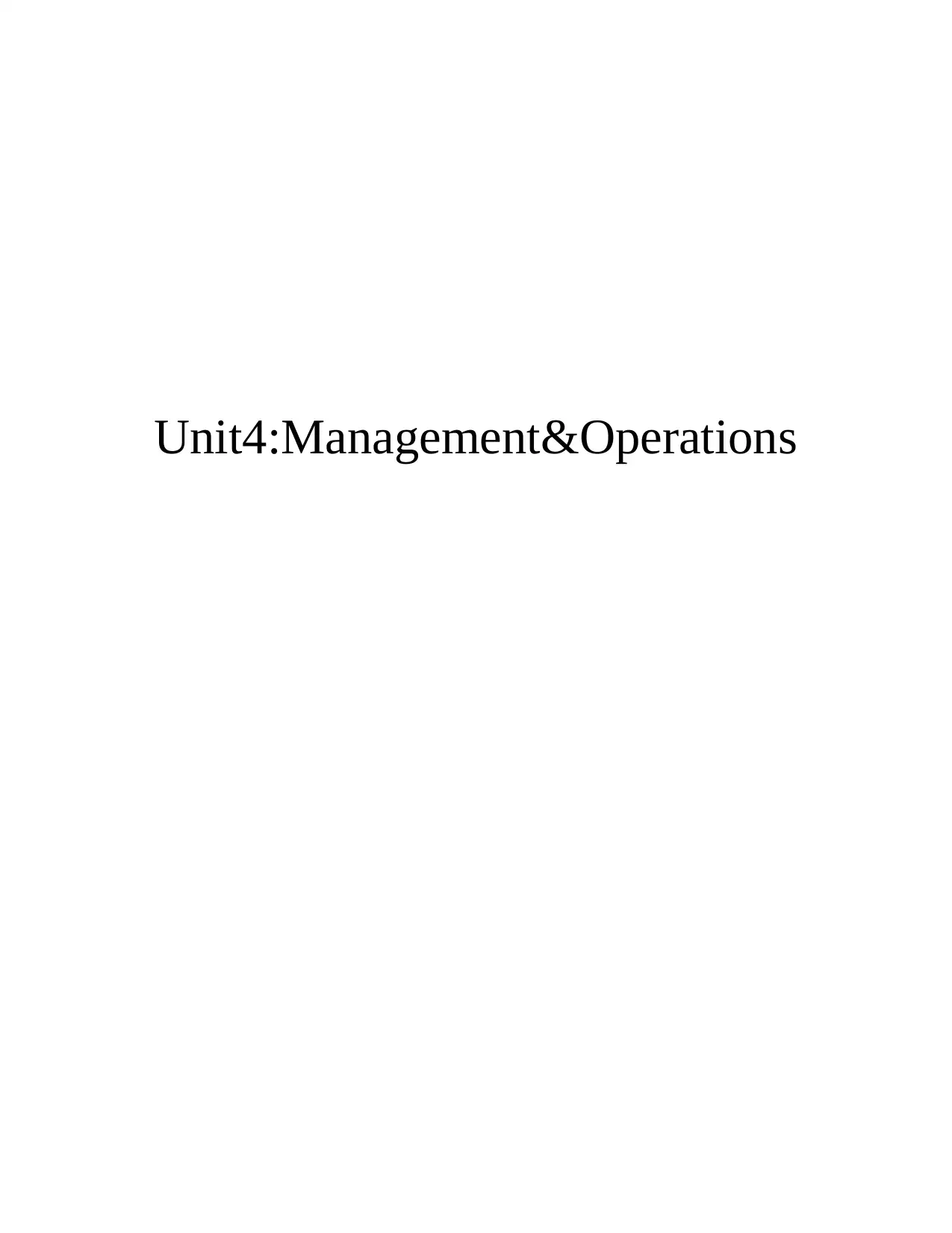
Unit4:Management&Operations
Paraphrase This Document
Need a fresh take? Get an instant paraphrase of this document with our AI Paraphraser
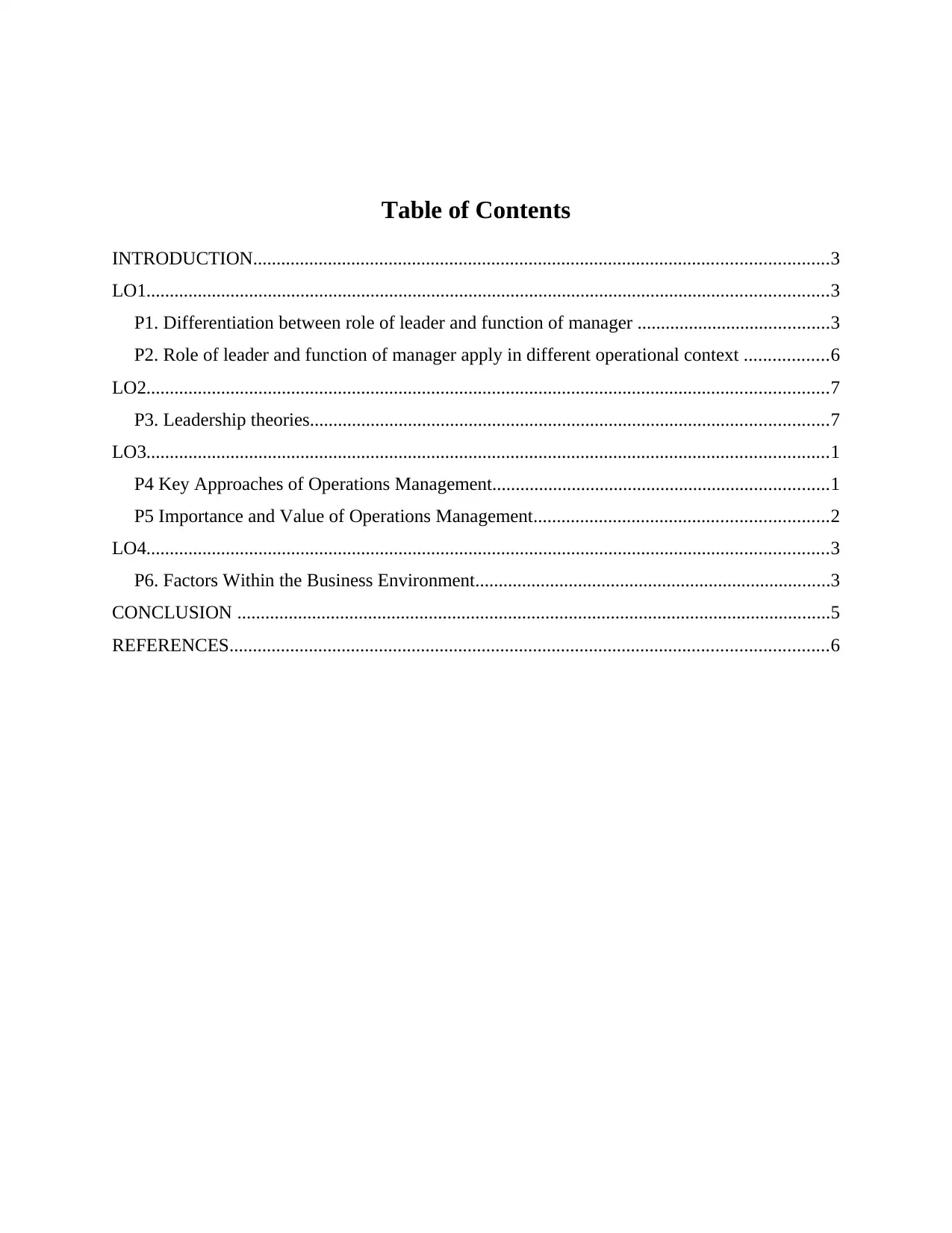
Table of Contents
INTRODUCTION...........................................................................................................................3
LO1..................................................................................................................................................3
P1. Differentiation between role of leader and function of manager .........................................3
P2. Role of leader and function of manager apply in different operational context ..................6
LO2..................................................................................................................................................7
P3. Leadership theories...............................................................................................................7
LO3..................................................................................................................................................1
P4 Key Approaches of Operations Management........................................................................1
P5 Importance and Value of Operations Management...............................................................2
LO4..................................................................................................................................................3
P6. Factors Within the Business Environment............................................................................3
CONCLUSION ...............................................................................................................................5
REFERENCES................................................................................................................................6
INTRODUCTION...........................................................................................................................3
LO1..................................................................................................................................................3
P1. Differentiation between role of leader and function of manager .........................................3
P2. Role of leader and function of manager apply in different operational context ..................6
LO2..................................................................................................................................................7
P3. Leadership theories...............................................................................................................7
LO3..................................................................................................................................................1
P4 Key Approaches of Operations Management........................................................................1
P5 Importance and Value of Operations Management...............................................................2
LO4..................................................................................................................................................3
P6. Factors Within the Business Environment............................................................................3
CONCLUSION ...............................................................................................................................5
REFERENCES................................................................................................................................6
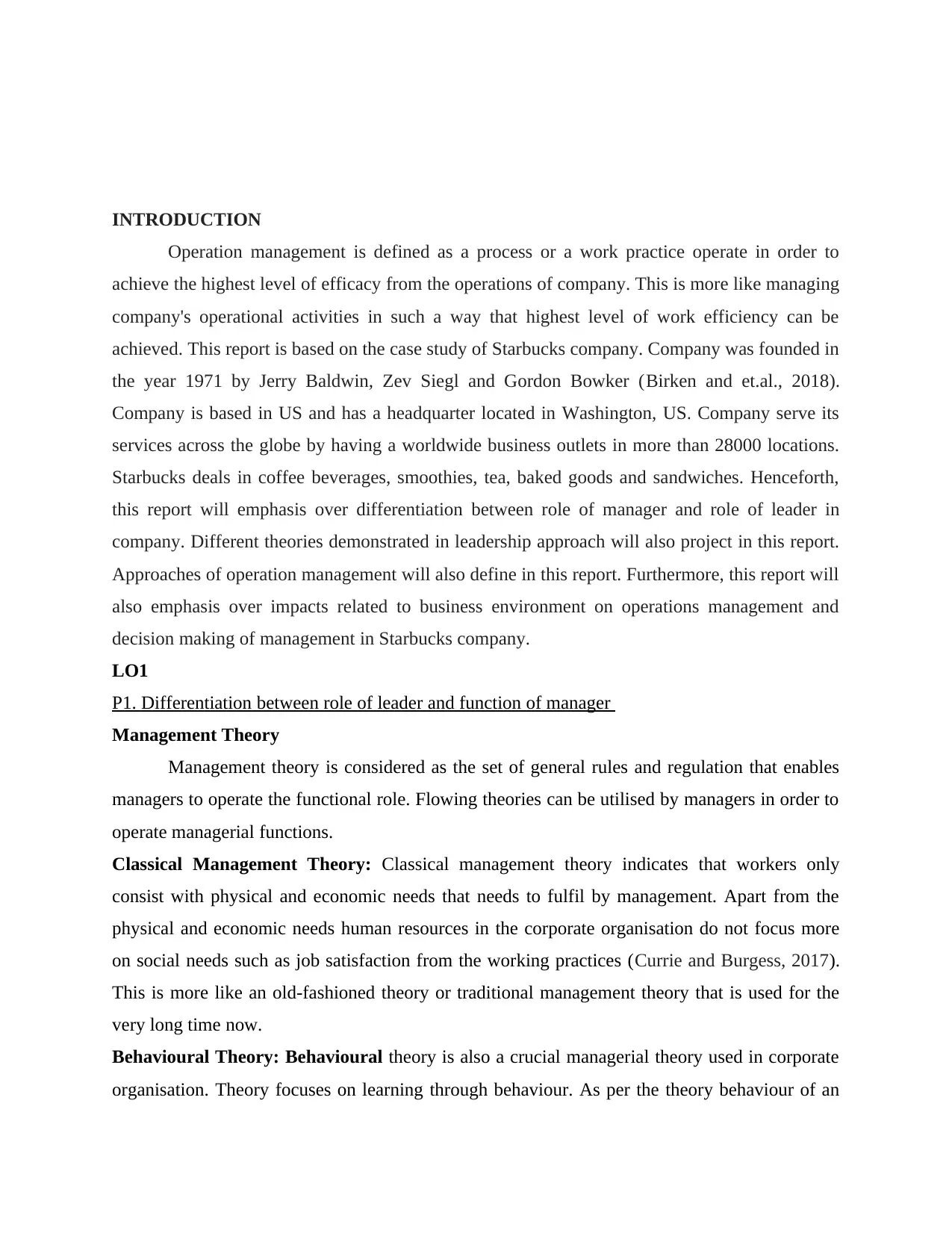
INTRODUCTION
Operation management is defined as a process or a work practice operate in order to
achieve the highest level of efficacy from the operations of company. This is more like managing
company's operational activities in such a way that highest level of work efficiency can be
achieved. This report is based on the case study of Starbucks company. Company was founded in
the year 1971 by Jerry Baldwin, Zev Siegl and Gordon Bowker (Birken and et.al., 2018).
Company is based in US and has a headquarter located in Washington, US. Company serve its
services across the globe by having a worldwide business outlets in more than 28000 locations.
Starbucks deals in coffee beverages, smoothies, tea, baked goods and sandwiches. Henceforth,
this report will emphasis over differentiation between role of manager and role of leader in
company. Different theories demonstrated in leadership approach will also project in this report.
Approaches of operation management will also define in this report. Furthermore, this report will
also emphasis over impacts related to business environment on operations management and
decision making of management in Starbucks company.
LO1
P1. Differentiation between role of leader and function of manager
Management Theory
Management theory is considered as the set of general rules and regulation that enables
managers to operate the functional role. Flowing theories can be utilised by managers in order to
operate managerial functions.
Classical Management Theory: Classical management theory indicates that workers only
consist with physical and economic needs that needs to fulfil by management. Apart from the
physical and economic needs human resources in the corporate organisation do not focus more
on social needs such as job satisfaction from the working practices (Currie and Burgess, 2017).
This is more like an old-fashioned theory or traditional management theory that is used for the
very long time now.
Behavioural Theory: Behavioural theory is also a crucial managerial theory used in corporate
organisation. Theory focuses on learning through behaviour. As per the theory behaviour of an
Operation management is defined as a process or a work practice operate in order to
achieve the highest level of efficacy from the operations of company. This is more like managing
company's operational activities in such a way that highest level of work efficiency can be
achieved. This report is based on the case study of Starbucks company. Company was founded in
the year 1971 by Jerry Baldwin, Zev Siegl and Gordon Bowker (Birken and et.al., 2018).
Company is based in US and has a headquarter located in Washington, US. Company serve its
services across the globe by having a worldwide business outlets in more than 28000 locations.
Starbucks deals in coffee beverages, smoothies, tea, baked goods and sandwiches. Henceforth,
this report will emphasis over differentiation between role of manager and role of leader in
company. Different theories demonstrated in leadership approach will also project in this report.
Approaches of operation management will also define in this report. Furthermore, this report will
also emphasis over impacts related to business environment on operations management and
decision making of management in Starbucks company.
LO1
P1. Differentiation between role of leader and function of manager
Management Theory
Management theory is considered as the set of general rules and regulation that enables
managers to operate the functional role. Flowing theories can be utilised by managers in order to
operate managerial functions.
Classical Management Theory: Classical management theory indicates that workers only
consist with physical and economic needs that needs to fulfil by management. Apart from the
physical and economic needs human resources in the corporate organisation do not focus more
on social needs such as job satisfaction from the working practices (Currie and Burgess, 2017).
This is more like an old-fashioned theory or traditional management theory that is used for the
very long time now.
Behavioural Theory: Behavioural theory is also a crucial managerial theory used in corporate
organisation. Theory focuses on learning through behaviour. As per the theory behaviour of an
⊘ This is a preview!⊘
Do you want full access?
Subscribe today to unlock all pages.

Trusted by 1+ million students worldwide
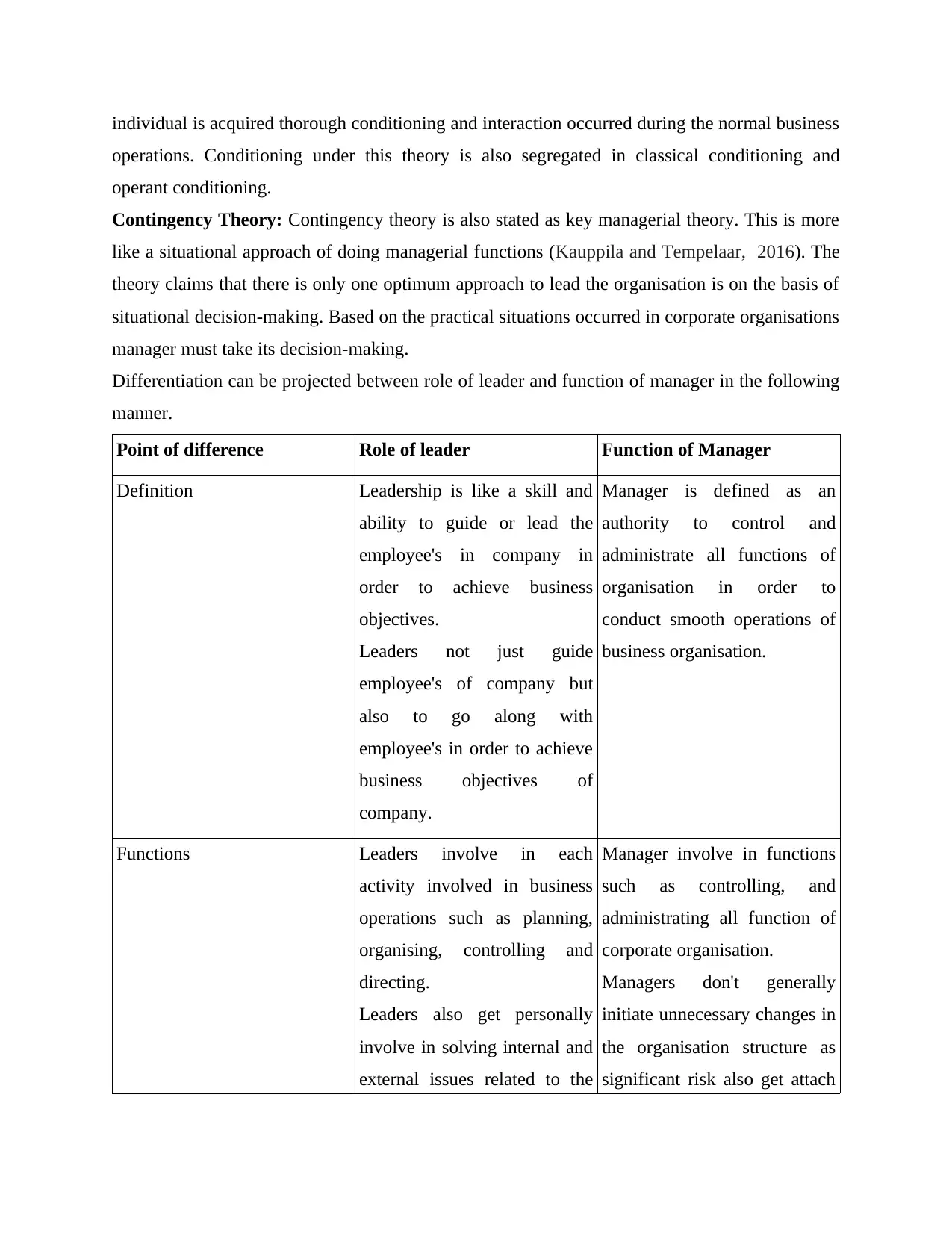
individual is acquired thorough conditioning and interaction occurred during the normal business
operations. Conditioning under this theory is also segregated in classical conditioning and
operant conditioning.
Contingency Theory: Contingency theory is also stated as key managerial theory. This is more
like a situational approach of doing managerial functions (Kauppila and Tempelaar, 2016). The
theory claims that there is only one optimum approach to lead the organisation is on the basis of
situational decision-making. Based on the practical situations occurred in corporate organisations
manager must take its decision-making.
Differentiation can be projected between role of leader and function of manager in the following
manner.
Point of difference Role of leader Function of Manager
Definition Leadership is like a skill and
ability to guide or lead the
employee's in company in
order to achieve business
objectives.
Leaders not just guide
employee's of company but
also to go along with
employee's in order to achieve
business objectives of
company.
Manager is defined as an
authority to control and
administrate all functions of
organisation in order to
conduct smooth operations of
business organisation.
Functions Leaders involve in each
activity involved in business
operations such as planning,
organising, controlling and
directing.
Leaders also get personally
involve in solving internal and
external issues related to the
Manager involve in functions
such as controlling, and
administrating all function of
corporate organisation.
Managers don't generally
initiate unnecessary changes in
the organisation structure as
significant risk also get attach
operations. Conditioning under this theory is also segregated in classical conditioning and
operant conditioning.
Contingency Theory: Contingency theory is also stated as key managerial theory. This is more
like a situational approach of doing managerial functions (Kauppila and Tempelaar, 2016). The
theory claims that there is only one optimum approach to lead the organisation is on the basis of
situational decision-making. Based on the practical situations occurred in corporate organisations
manager must take its decision-making.
Differentiation can be projected between role of leader and function of manager in the following
manner.
Point of difference Role of leader Function of Manager
Definition Leadership is like a skill and
ability to guide or lead the
employee's in company in
order to achieve business
objectives.
Leaders not just guide
employee's of company but
also to go along with
employee's in order to achieve
business objectives of
company.
Manager is defined as an
authority to control and
administrate all functions of
organisation in order to
conduct smooth operations of
business organisation.
Functions Leaders involve in each
activity involved in business
operations such as planning,
organising, controlling and
directing.
Leaders also get personally
involve in solving internal and
external issues related to the
Manager involve in functions
such as controlling, and
administrating all function of
corporate organisation.
Managers don't generally
initiate unnecessary changes in
the organisation structure as
significant risk also get attach
Paraphrase This Document
Need a fresh take? Get an instant paraphrase of this document with our AI Paraphraser
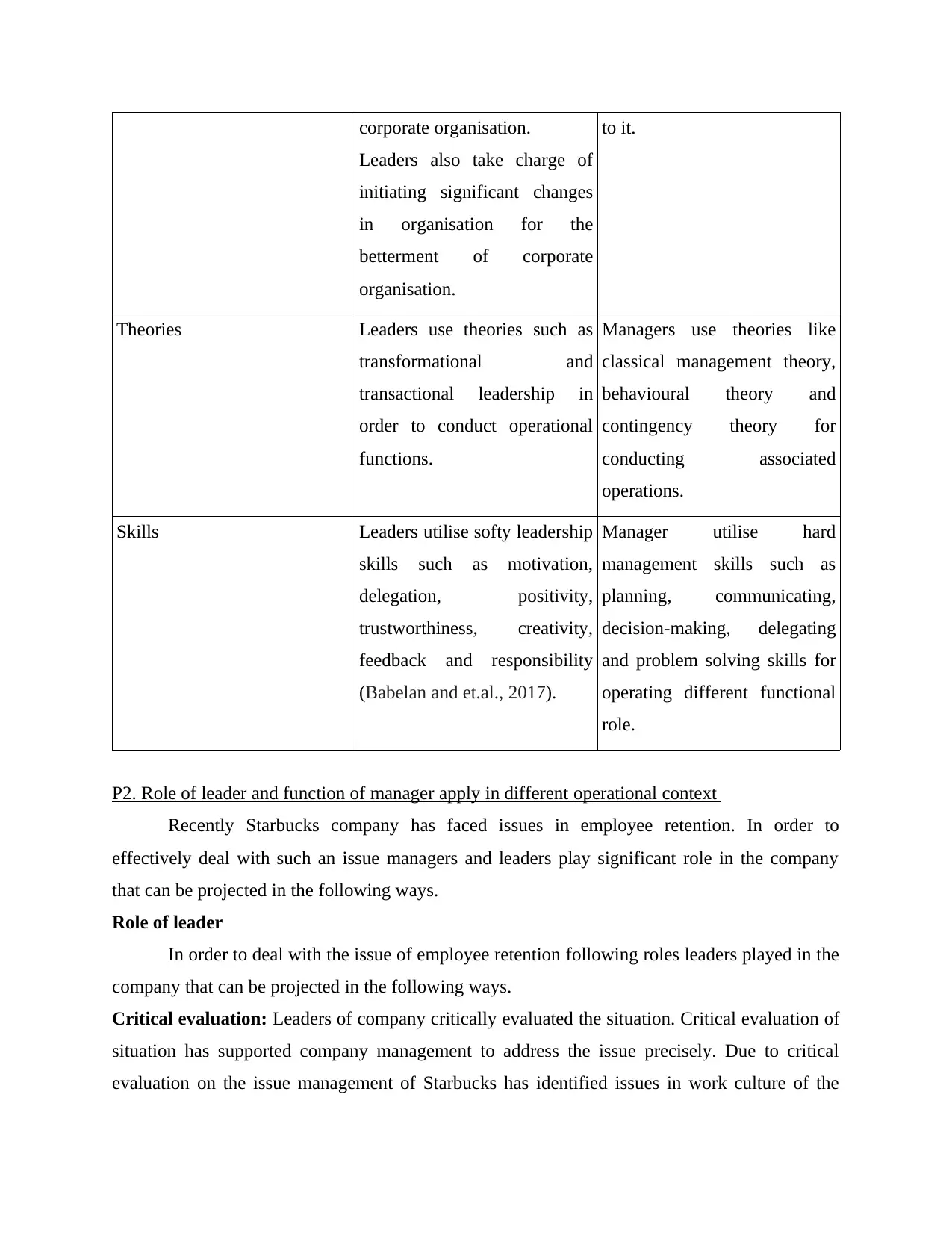
corporate organisation.
Leaders also take charge of
initiating significant changes
in organisation for the
betterment of corporate
organisation.
to it.
Theories Leaders use theories such as
transformational and
transactional leadership in
order to conduct operational
functions.
Managers use theories like
classical management theory,
behavioural theory and
contingency theory for
conducting associated
operations.
Skills Leaders utilise softy leadership
skills such as motivation,
delegation, positivity,
trustworthiness, creativity,
feedback and responsibility
(Babelan and et.al., 2017).
Manager utilise hard
management skills such as
planning, communicating,
decision-making, delegating
and problem solving skills for
operating different functional
role.
P2. Role of leader and function of manager apply in different operational context
Recently Starbucks company has faced issues in employee retention. In order to
effectively deal with such an issue managers and leaders play significant role in the company
that can be projected in the following ways.
Role of leader
In order to deal with the issue of employee retention following roles leaders played in the
company that can be projected in the following ways.
Critical evaluation: Leaders of company critically evaluated the situation. Critical evaluation of
situation has supported company management to address the issue precisely. Due to critical
evaluation on the issue management of Starbucks has identified issues in work culture of the
Leaders also take charge of
initiating significant changes
in organisation for the
betterment of corporate
organisation.
to it.
Theories Leaders use theories such as
transformational and
transactional leadership in
order to conduct operational
functions.
Managers use theories like
classical management theory,
behavioural theory and
contingency theory for
conducting associated
operations.
Skills Leaders utilise softy leadership
skills such as motivation,
delegation, positivity,
trustworthiness, creativity,
feedback and responsibility
(Babelan and et.al., 2017).
Manager utilise hard
management skills such as
planning, communicating,
decision-making, delegating
and problem solving skills for
operating different functional
role.
P2. Role of leader and function of manager apply in different operational context
Recently Starbucks company has faced issues in employee retention. In order to
effectively deal with such an issue managers and leaders play significant role in the company
that can be projected in the following ways.
Role of leader
In order to deal with the issue of employee retention following roles leaders played in the
company that can be projected in the following ways.
Critical evaluation: Leaders of company critically evaluated the situation. Critical evaluation of
situation has supported company management to address the issue precisely. Due to critical
evaluation on the issue management of Starbucks has identified issues in work culture of the
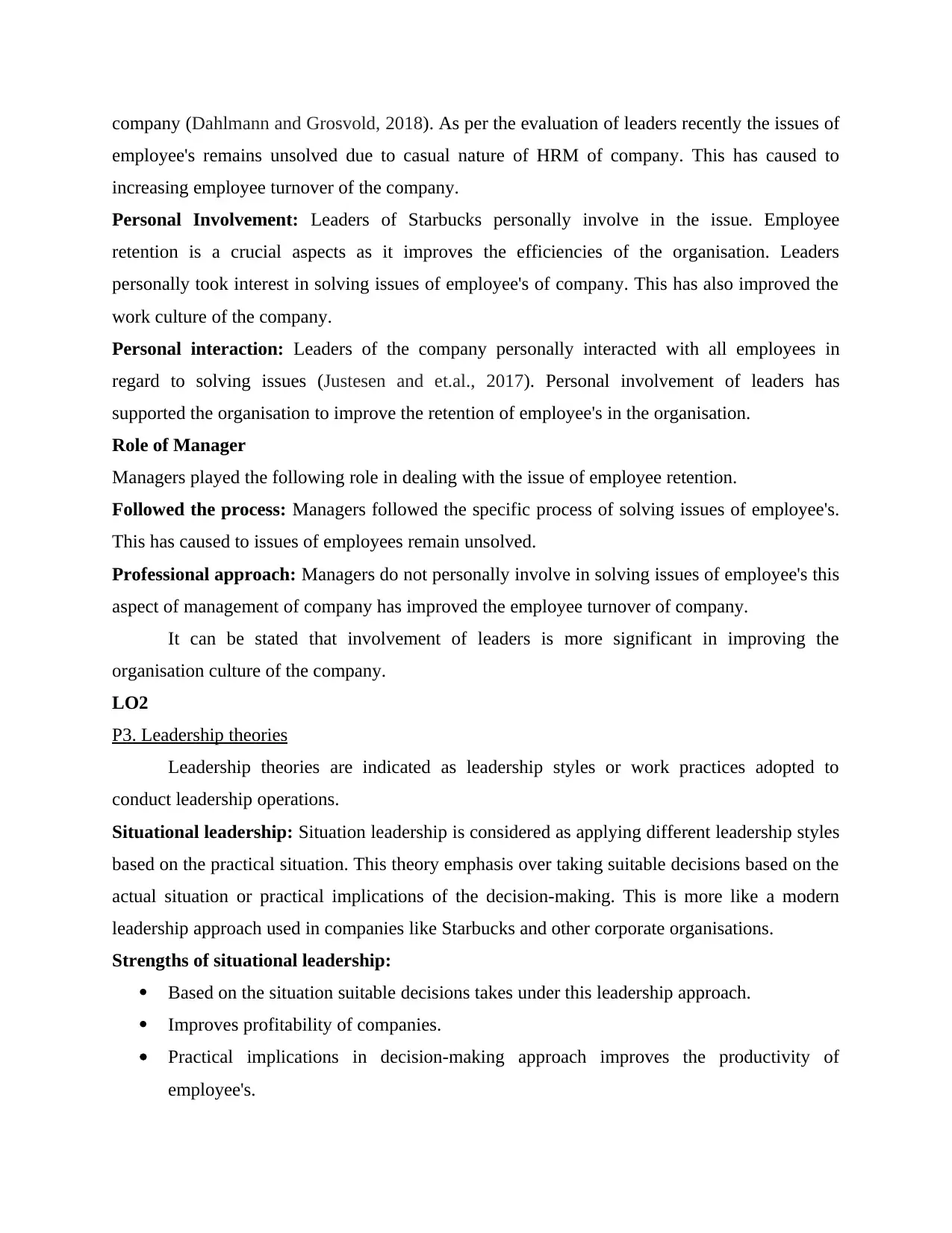
company (Dahlmann and Grosvold, 2018). As per the evaluation of leaders recently the issues of
employee's remains unsolved due to casual nature of HRM of company. This has caused to
increasing employee turnover of the company.
Personal Involvement: Leaders of Starbucks personally involve in the issue. Employee
retention is a crucial aspects as it improves the efficiencies of the organisation. Leaders
personally took interest in solving issues of employee's of company. This has also improved the
work culture of the company.
Personal interaction: Leaders of the company personally interacted with all employees in
regard to solving issues (Justesen and et.al., 2017). Personal involvement of leaders has
supported the organisation to improve the retention of employee's in the organisation.
Role of Manager
Managers played the following role in dealing with the issue of employee retention.
Followed the process: Managers followed the specific process of solving issues of employee's.
This has caused to issues of employees remain unsolved.
Professional approach: Managers do not personally involve in solving issues of employee's this
aspect of management of company has improved the employee turnover of company.
It can be stated that involvement of leaders is more significant in improving the
organisation culture of the company.
LO2
P3. Leadership theories
Leadership theories are indicated as leadership styles or work practices adopted to
conduct leadership operations.
Situational leadership: Situation leadership is considered as applying different leadership styles
based on the practical situation. This theory emphasis over taking suitable decisions based on the
actual situation or practical implications of the decision-making. This is more like a modern
leadership approach used in companies like Starbucks and other corporate organisations.
Strengths of situational leadership:
Based on the situation suitable decisions takes under this leadership approach.
Improves profitability of companies.
Practical implications in decision-making approach improves the productivity of
employee's.
employee's remains unsolved due to casual nature of HRM of company. This has caused to
increasing employee turnover of the company.
Personal Involvement: Leaders of Starbucks personally involve in the issue. Employee
retention is a crucial aspects as it improves the efficiencies of the organisation. Leaders
personally took interest in solving issues of employee's of company. This has also improved the
work culture of the company.
Personal interaction: Leaders of the company personally interacted with all employees in
regard to solving issues (Justesen and et.al., 2017). Personal involvement of leaders has
supported the organisation to improve the retention of employee's in the organisation.
Role of Manager
Managers played the following role in dealing with the issue of employee retention.
Followed the process: Managers followed the specific process of solving issues of employee's.
This has caused to issues of employees remain unsolved.
Professional approach: Managers do not personally involve in solving issues of employee's this
aspect of management of company has improved the employee turnover of company.
It can be stated that involvement of leaders is more significant in improving the
organisation culture of the company.
LO2
P3. Leadership theories
Leadership theories are indicated as leadership styles or work practices adopted to
conduct leadership operations.
Situational leadership: Situation leadership is considered as applying different leadership styles
based on the practical situation. This theory emphasis over taking suitable decisions based on the
actual situation or practical implications of the decision-making. This is more like a modern
leadership approach used in companies like Starbucks and other corporate organisations.
Strengths of situational leadership:
Based on the situation suitable decisions takes under this leadership approach.
Improves profitability of companies.
Practical implications in decision-making approach improves the productivity of
employee's.
⊘ This is a preview!⊘
Do you want full access?
Subscribe today to unlock all pages.

Trusted by 1+ million students worldwide
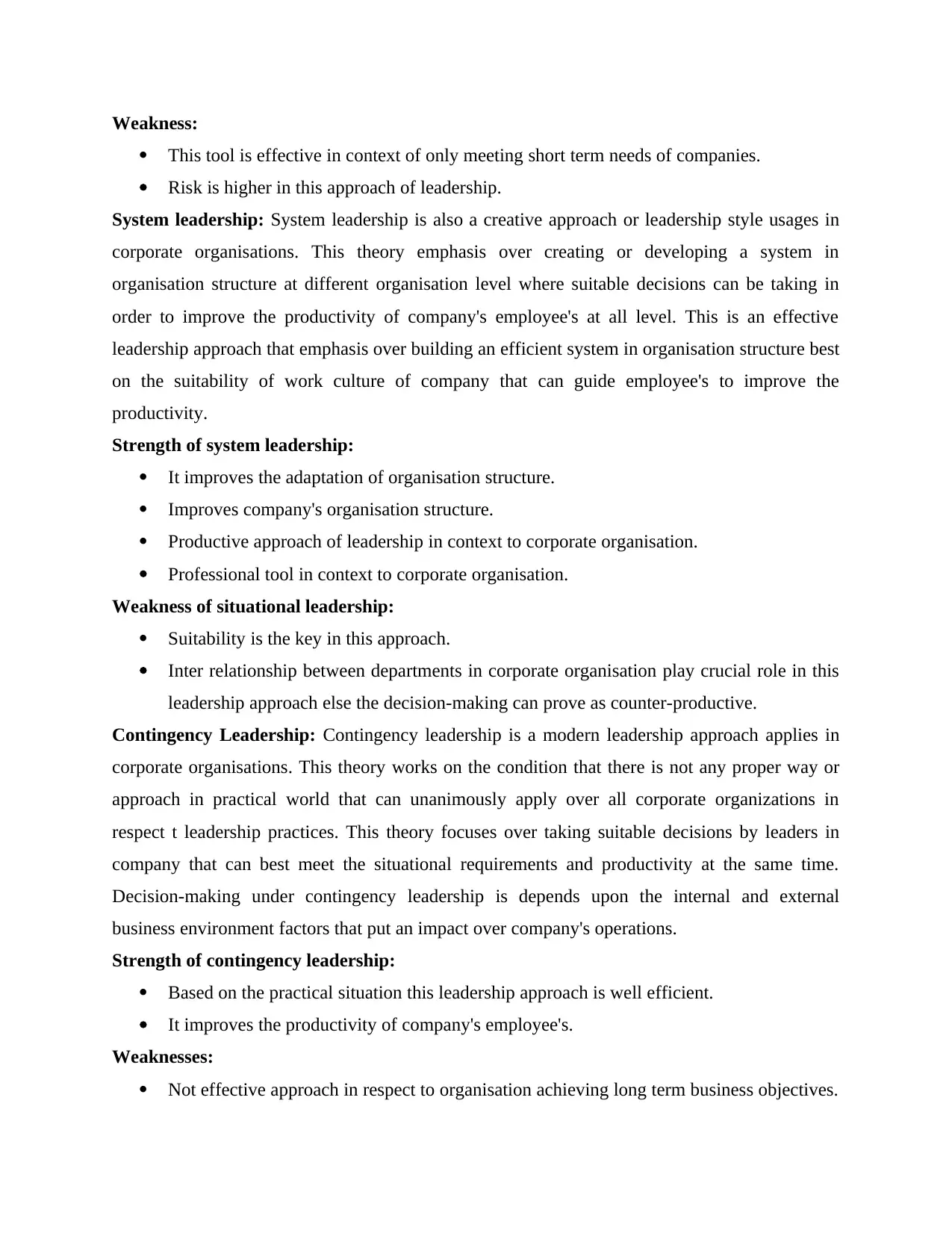
Weakness:
This tool is effective in context of only meeting short term needs of companies.
Risk is higher in this approach of leadership.
System leadership: System leadership is also a creative approach or leadership style usages in
corporate organisations. This theory emphasis over creating or developing a system in
organisation structure at different organisation level where suitable decisions can be taking in
order to improve the productivity of company's employee's at all level. This is an effective
leadership approach that emphasis over building an efficient system in organisation structure best
on the suitability of work culture of company that can guide employee's to improve the
productivity.
Strength of system leadership:
It improves the adaptation of organisation structure.
Improves company's organisation structure.
Productive approach of leadership in context to corporate organisation.
Professional tool in context to corporate organisation.
Weakness of situational leadership:
Suitability is the key in this approach.
Inter relationship between departments in corporate organisation play crucial role in this
leadership approach else the decision-making can prove as counter-productive.
Contingency Leadership: Contingency leadership is a modern leadership approach applies in
corporate organisations. This theory works on the condition that there is not any proper way or
approach in practical world that can unanimously apply over all corporate organizations in
respect t leadership practices. This theory focuses over taking suitable decisions by leaders in
company that can best meet the situational requirements and productivity at the same time.
Decision-making under contingency leadership is depends upon the internal and external
business environment factors that put an impact over company's operations.
Strength of contingency leadership:
Based on the practical situation this leadership approach is well efficient.
It improves the productivity of company's employee's.
Weaknesses:
Not effective approach in respect to organisation achieving long term business objectives.
This tool is effective in context of only meeting short term needs of companies.
Risk is higher in this approach of leadership.
System leadership: System leadership is also a creative approach or leadership style usages in
corporate organisations. This theory emphasis over creating or developing a system in
organisation structure at different organisation level where suitable decisions can be taking in
order to improve the productivity of company's employee's at all level. This is an effective
leadership approach that emphasis over building an efficient system in organisation structure best
on the suitability of work culture of company that can guide employee's to improve the
productivity.
Strength of system leadership:
It improves the adaptation of organisation structure.
Improves company's organisation structure.
Productive approach of leadership in context to corporate organisation.
Professional tool in context to corporate organisation.
Weakness of situational leadership:
Suitability is the key in this approach.
Inter relationship between departments in corporate organisation play crucial role in this
leadership approach else the decision-making can prove as counter-productive.
Contingency Leadership: Contingency leadership is a modern leadership approach applies in
corporate organisations. This theory works on the condition that there is not any proper way or
approach in practical world that can unanimously apply over all corporate organizations in
respect t leadership practices. This theory focuses over taking suitable decisions by leaders in
company that can best meet the situational requirements and productivity at the same time.
Decision-making under contingency leadership is depends upon the internal and external
business environment factors that put an impact over company's operations.
Strength of contingency leadership:
Based on the practical situation this leadership approach is well efficient.
It improves the productivity of company's employee's.
Weaknesses:
Not effective approach in respect to organisation achieving long term business objectives.
Paraphrase This Document
Need a fresh take? Get an instant paraphrase of this document with our AI Paraphraser

Many time due to this approach many issues also raise in organisation structure.
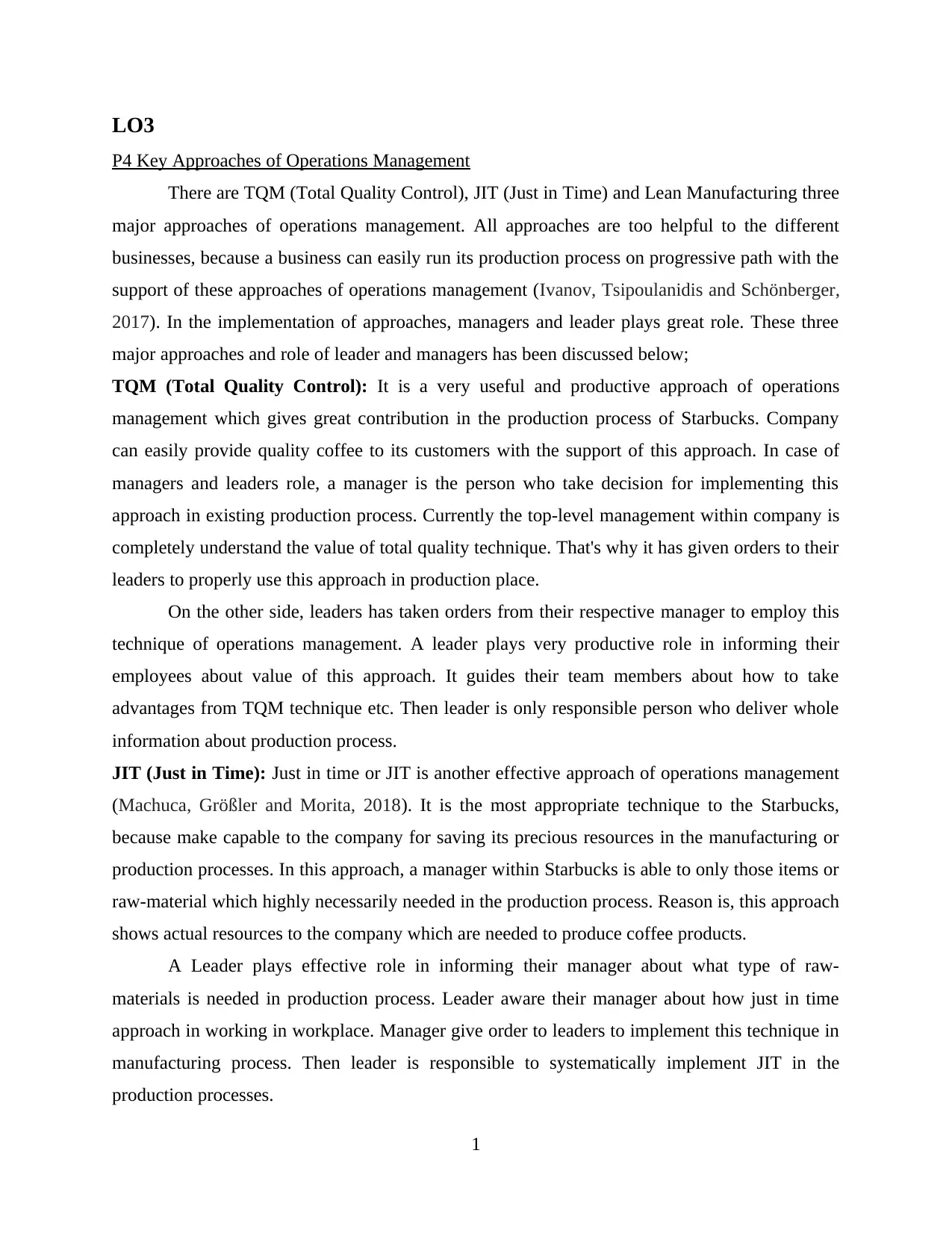
LO3
P4 Key Approaches of Operations Management
There are TQM (Total Quality Control), JIT (Just in Time) and Lean Manufacturing three
major approaches of operations management. All approaches are too helpful to the different
businesses, because a business can easily run its production process on progressive path with the
support of these approaches of operations management (Ivanov, Tsipoulanidis and Schönberger,
2017). In the implementation of approaches, managers and leader plays great role. These three
major approaches and role of leader and managers has been discussed below;
TQM (Total Quality Control): It is a very useful and productive approach of operations
management which gives great contribution in the production process of Starbucks. Company
can easily provide quality coffee to its customers with the support of this approach. In case of
managers and leaders role, a manager is the person who take decision for implementing this
approach in existing production process. Currently the top-level management within company is
completely understand the value of total quality technique. That's why it has given orders to their
leaders to properly use this approach in production place.
On the other side, leaders has taken orders from their respective manager to employ this
technique of operations management. A leader plays very productive role in informing their
employees about value of this approach. It guides their team members about how to take
advantages from TQM technique etc. Then leader is only responsible person who deliver whole
information about production process.
JIT (Just in Time): Just in time or JIT is another effective approach of operations management
(Machuca, Größler and Morita, 2018). It is the most appropriate technique to the Starbucks,
because make capable to the company for saving its precious resources in the manufacturing or
production processes. In this approach, a manager within Starbucks is able to only those items or
raw-material which highly necessarily needed in the production process. Reason is, this approach
shows actual resources to the company which are needed to produce coffee products.
A Leader plays effective role in informing their manager about what type of raw-
materials is needed in production process. Leader aware their manager about how just in time
approach in working in workplace. Manager give order to leaders to implement this technique in
manufacturing process. Then leader is responsible to systematically implement JIT in the
production processes.
1
P4 Key Approaches of Operations Management
There are TQM (Total Quality Control), JIT (Just in Time) and Lean Manufacturing three
major approaches of operations management. All approaches are too helpful to the different
businesses, because a business can easily run its production process on progressive path with the
support of these approaches of operations management (Ivanov, Tsipoulanidis and Schönberger,
2017). In the implementation of approaches, managers and leader plays great role. These three
major approaches and role of leader and managers has been discussed below;
TQM (Total Quality Control): It is a very useful and productive approach of operations
management which gives great contribution in the production process of Starbucks. Company
can easily provide quality coffee to its customers with the support of this approach. In case of
managers and leaders role, a manager is the person who take decision for implementing this
approach in existing production process. Currently the top-level management within company is
completely understand the value of total quality technique. That's why it has given orders to their
leaders to properly use this approach in production place.
On the other side, leaders has taken orders from their respective manager to employ this
technique of operations management. A leader plays very productive role in informing their
employees about value of this approach. It guides their team members about how to take
advantages from TQM technique etc. Then leader is only responsible person who deliver whole
information about production process.
JIT (Just in Time): Just in time or JIT is another effective approach of operations management
(Machuca, Größler and Morita, 2018). It is the most appropriate technique to the Starbucks,
because make capable to the company for saving its precious resources in the manufacturing or
production processes. In this approach, a manager within Starbucks is able to only those items or
raw-material which highly necessarily needed in the production process. Reason is, this approach
shows actual resources to the company which are needed to produce coffee products.
A Leader plays effective role in informing their manager about what type of raw-
materials is needed in production process. Leader aware their manager about how just in time
approach in working in workplace. Manager give order to leaders to implement this technique in
manufacturing process. Then leader is responsible to systematically implement JIT in the
production processes.
1
⊘ This is a preview!⊘
Do you want full access?
Subscribe today to unlock all pages.

Trusted by 1+ million students worldwide
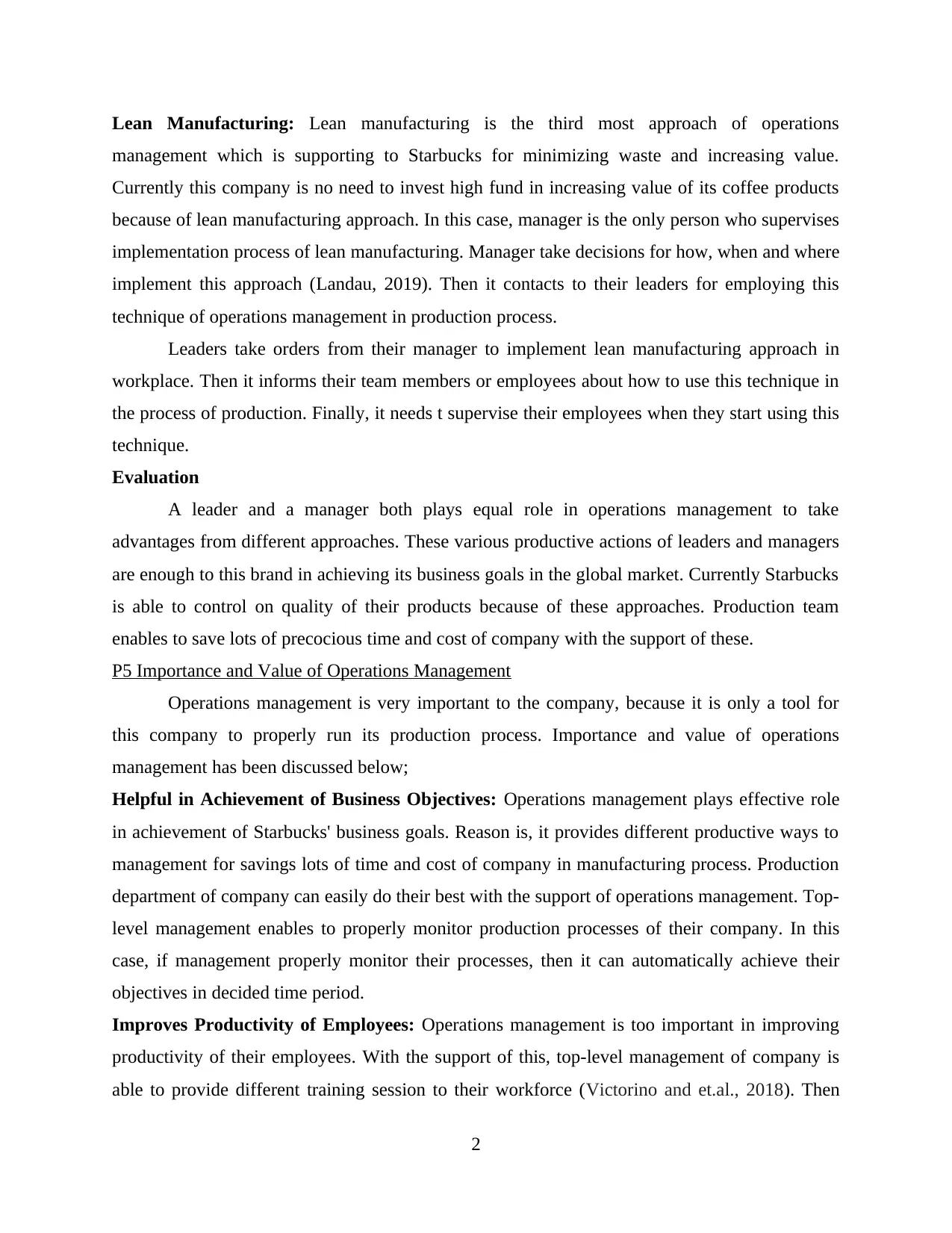
Lean Manufacturing: Lean manufacturing is the third most approach of operations
management which is supporting to Starbucks for minimizing waste and increasing value.
Currently this company is no need to invest high fund in increasing value of its coffee products
because of lean manufacturing approach. In this case, manager is the only person who supervises
implementation process of lean manufacturing. Manager take decisions for how, when and where
implement this approach (Landau, 2019). Then it contacts to their leaders for employing this
technique of operations management in production process.
Leaders take orders from their manager to implement lean manufacturing approach in
workplace. Then it informs their team members or employees about how to use this technique in
the process of production. Finally, it needs t supervise their employees when they start using this
technique.
Evaluation
A leader and a manager both plays equal role in operations management to take
advantages from different approaches. These various productive actions of leaders and managers
are enough to this brand in achieving its business goals in the global market. Currently Starbucks
is able to control on quality of their products because of these approaches. Production team
enables to save lots of precocious time and cost of company with the support of these.
P5 Importance and Value of Operations Management
Operations management is very important to the company, because it is only a tool for
this company to properly run its production process. Importance and value of operations
management has been discussed below;
Helpful in Achievement of Business Objectives: Operations management plays effective role
in achievement of Starbucks' business goals. Reason is, it provides different productive ways to
management for savings lots of time and cost of company in manufacturing process. Production
department of company can easily do their best with the support of operations management. Top-
level management enables to properly monitor production processes of their company. In this
case, if management properly monitor their processes, then it can automatically achieve their
objectives in decided time period.
Improves Productivity of Employees: Operations management is too important in improving
productivity of their employees. With the support of this, top-level management of company is
able to provide different training session to their workforce (Victorino and et.al., 2018). Then
2
management which is supporting to Starbucks for minimizing waste and increasing value.
Currently this company is no need to invest high fund in increasing value of its coffee products
because of lean manufacturing approach. In this case, manager is the only person who supervises
implementation process of lean manufacturing. Manager take decisions for how, when and where
implement this approach (Landau, 2019). Then it contacts to their leaders for employing this
technique of operations management in production process.
Leaders take orders from their manager to implement lean manufacturing approach in
workplace. Then it informs their team members or employees about how to use this technique in
the process of production. Finally, it needs t supervise their employees when they start using this
technique.
Evaluation
A leader and a manager both plays equal role in operations management to take
advantages from different approaches. These various productive actions of leaders and managers
are enough to this brand in achieving its business goals in the global market. Currently Starbucks
is able to control on quality of their products because of these approaches. Production team
enables to save lots of precocious time and cost of company with the support of these.
P5 Importance and Value of Operations Management
Operations management is very important to the company, because it is only a tool for
this company to properly run its production process. Importance and value of operations
management has been discussed below;
Helpful in Achievement of Business Objectives: Operations management plays effective role
in achievement of Starbucks' business goals. Reason is, it provides different productive ways to
management for savings lots of time and cost of company in manufacturing process. Production
department of company can easily do their best with the support of operations management. Top-
level management enables to properly monitor production processes of their company. In this
case, if management properly monitor their processes, then it can automatically achieve their
objectives in decided time period.
Improves Productivity of Employees: Operations management is too important in improving
productivity of their employees. With the support of this, top-level management of company is
able to provide different training session to their workforce (Victorino and et.al., 2018). Then
2
Paraphrase This Document
Need a fresh take? Get an instant paraphrase of this document with our AI Paraphraser
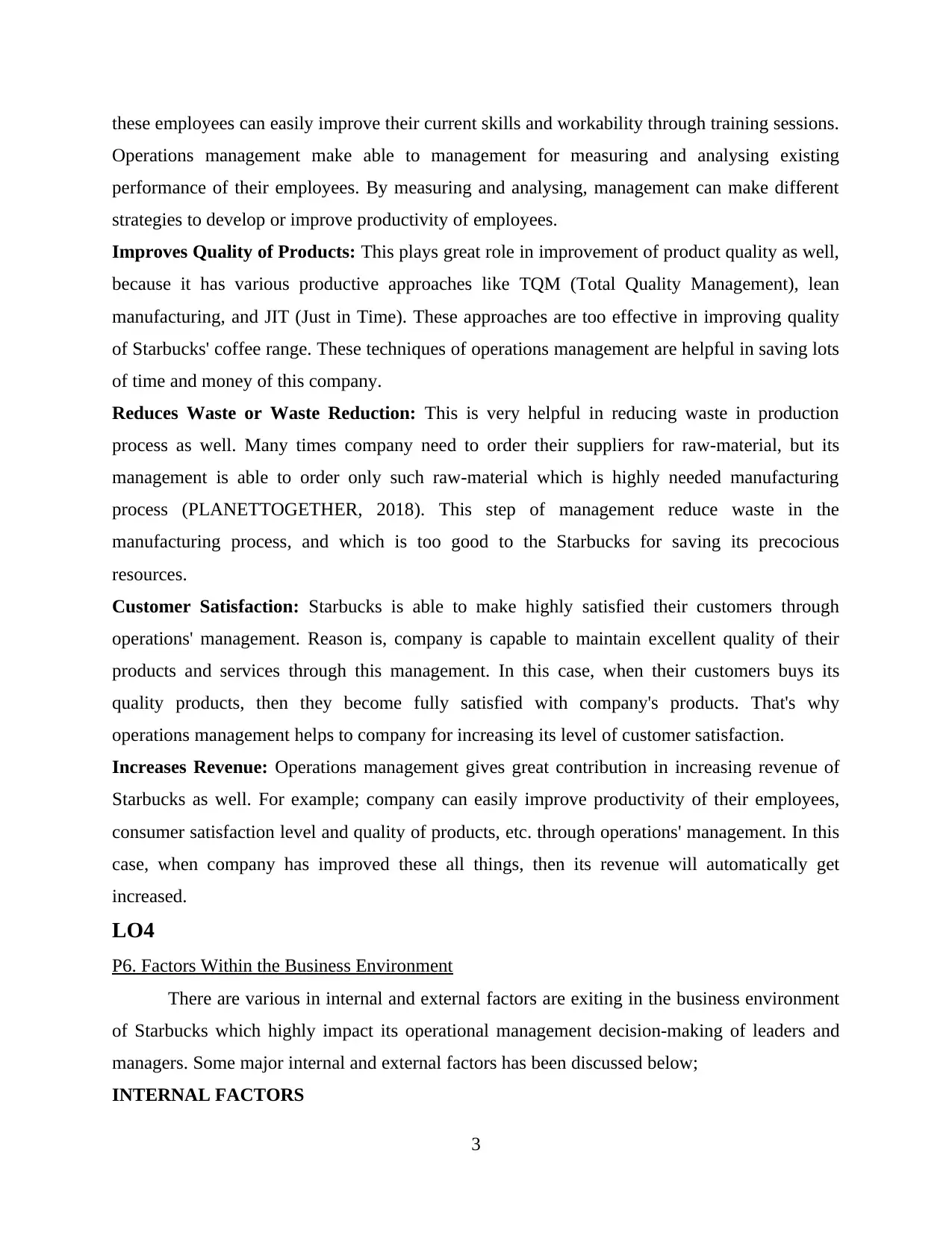
these employees can easily improve their current skills and workability through training sessions.
Operations management make able to management for measuring and analysing existing
performance of their employees. By measuring and analysing, management can make different
strategies to develop or improve productivity of employees.
Improves Quality of Products: This plays great role in improvement of product quality as well,
because it has various productive approaches like TQM (Total Quality Management), lean
manufacturing, and JIT (Just in Time). These approaches are too effective in improving quality
of Starbucks' coffee range. These techniques of operations management are helpful in saving lots
of time and money of this company.
Reduces Waste or Waste Reduction: This is very helpful in reducing waste in production
process as well. Many times company need to order their suppliers for raw-material, but its
management is able to order only such raw-material which is highly needed manufacturing
process (PLANETTOGETHER, 2018). This step of management reduce waste in the
manufacturing process, and which is too good to the Starbucks for saving its precocious
resources.
Customer Satisfaction: Starbucks is able to make highly satisfied their customers through
operations' management. Reason is, company is capable to maintain excellent quality of their
products and services through this management. In this case, when their customers buys its
quality products, then they become fully satisfied with company's products. That's why
operations management helps to company for increasing its level of customer satisfaction.
Increases Revenue: Operations management gives great contribution in increasing revenue of
Starbucks as well. For example; company can easily improve productivity of their employees,
consumer satisfaction level and quality of products, etc. through operations' management. In this
case, when company has improved these all things, then its revenue will automatically get
increased.
LO4
P6. Factors Within the Business Environment
There are various in internal and external factors are exiting in the business environment
of Starbucks which highly impact its operational management decision-making of leaders and
managers. Some major internal and external factors has been discussed below;
INTERNAL FACTORS
3
Operations management make able to management for measuring and analysing existing
performance of their employees. By measuring and analysing, management can make different
strategies to develop or improve productivity of employees.
Improves Quality of Products: This plays great role in improvement of product quality as well,
because it has various productive approaches like TQM (Total Quality Management), lean
manufacturing, and JIT (Just in Time). These approaches are too effective in improving quality
of Starbucks' coffee range. These techniques of operations management are helpful in saving lots
of time and money of this company.
Reduces Waste or Waste Reduction: This is very helpful in reducing waste in production
process as well. Many times company need to order their suppliers for raw-material, but its
management is able to order only such raw-material which is highly needed manufacturing
process (PLANETTOGETHER, 2018). This step of management reduce waste in the
manufacturing process, and which is too good to the Starbucks for saving its precocious
resources.
Customer Satisfaction: Starbucks is able to make highly satisfied their customers through
operations' management. Reason is, company is capable to maintain excellent quality of their
products and services through this management. In this case, when their customers buys its
quality products, then they become fully satisfied with company's products. That's why
operations management helps to company for increasing its level of customer satisfaction.
Increases Revenue: Operations management gives great contribution in increasing revenue of
Starbucks as well. For example; company can easily improve productivity of their employees,
consumer satisfaction level and quality of products, etc. through operations' management. In this
case, when company has improved these all things, then its revenue will automatically get
increased.
LO4
P6. Factors Within the Business Environment
There are various in internal and external factors are exiting in the business environment
of Starbucks which highly impact its operational management decision-making of leaders and
managers. Some major internal and external factors has been discussed below;
INTERNAL FACTORS
3
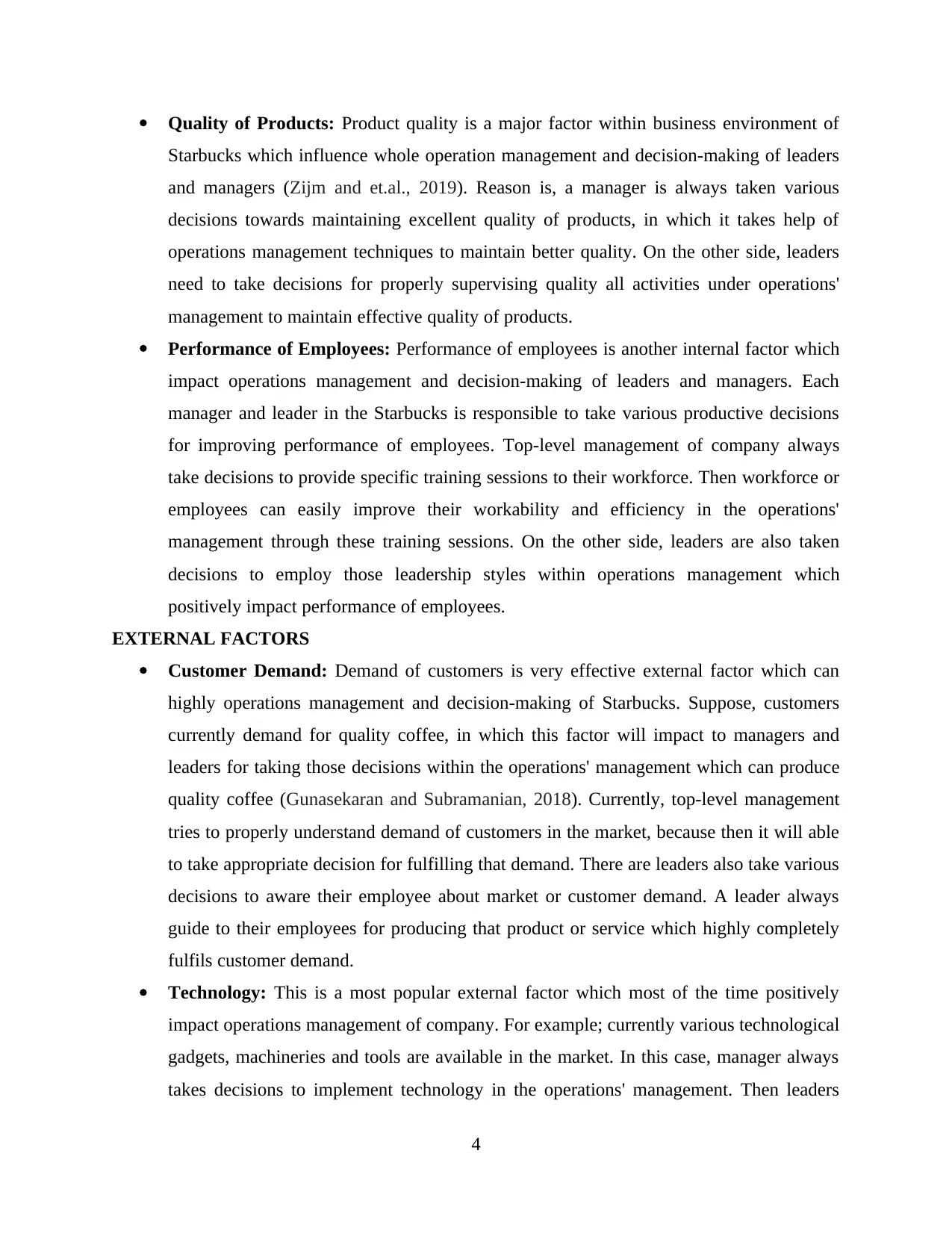
Quality of Products: Product quality is a major factor within business environment of
Starbucks which influence whole operation management and decision-making of leaders
and managers (Zijm and et.al., 2019). Reason is, a manager is always taken various
decisions towards maintaining excellent quality of products, in which it takes help of
operations management techniques to maintain better quality. On the other side, leaders
need to take decisions for properly supervising quality all activities under operations'
management to maintain effective quality of products.
Performance of Employees: Performance of employees is another internal factor which
impact operations management and decision-making of leaders and managers. Each
manager and leader in the Starbucks is responsible to take various productive decisions
for improving performance of employees. Top-level management of company always
take decisions to provide specific training sessions to their workforce. Then workforce or
employees can easily improve their workability and efficiency in the operations'
management through these training sessions. On the other side, leaders are also taken
decisions to employ those leadership styles within operations management which
positively impact performance of employees.
EXTERNAL FACTORS
Customer Demand: Demand of customers is very effective external factor which can
highly operations management and decision-making of Starbucks. Suppose, customers
currently demand for quality coffee, in which this factor will impact to managers and
leaders for taking those decisions within the operations' management which can produce
quality coffee (Gunasekaran and Subramanian, 2018). Currently, top-level management
tries to properly understand demand of customers in the market, because then it will able
to take appropriate decision for fulfilling that demand. There are leaders also take various
decisions to aware their employee about market or customer demand. A leader always
guide to their employees for producing that product or service which highly completely
fulfils customer demand.
Technology: This is a most popular external factor which most of the time positively
impact operations management of company. For example; currently various technological
gadgets, machineries and tools are available in the market. In this case, manager always
takes decisions to implement technology in the operations' management. Then leaders
4
Starbucks which influence whole operation management and decision-making of leaders
and managers (Zijm and et.al., 2019). Reason is, a manager is always taken various
decisions towards maintaining excellent quality of products, in which it takes help of
operations management techniques to maintain better quality. On the other side, leaders
need to take decisions for properly supervising quality all activities under operations'
management to maintain effective quality of products.
Performance of Employees: Performance of employees is another internal factor which
impact operations management and decision-making of leaders and managers. Each
manager and leader in the Starbucks is responsible to take various productive decisions
for improving performance of employees. Top-level management of company always
take decisions to provide specific training sessions to their workforce. Then workforce or
employees can easily improve their workability and efficiency in the operations'
management through these training sessions. On the other side, leaders are also taken
decisions to employ those leadership styles within operations management which
positively impact performance of employees.
EXTERNAL FACTORS
Customer Demand: Demand of customers is very effective external factor which can
highly operations management and decision-making of Starbucks. Suppose, customers
currently demand for quality coffee, in which this factor will impact to managers and
leaders for taking those decisions within the operations' management which can produce
quality coffee (Gunasekaran and Subramanian, 2018). Currently, top-level management
tries to properly understand demand of customers in the market, because then it will able
to take appropriate decision for fulfilling that demand. There are leaders also take various
decisions to aware their employee about market or customer demand. A leader always
guide to their employees for producing that product or service which highly completely
fulfils customer demand.
Technology: This is a most popular external factor which most of the time positively
impact operations management of company. For example; currently various technological
gadgets, machineries and tools are available in the market. In this case, manager always
takes decisions to implement technology in the operations' management. Then leaders
4
⊘ This is a preview!⊘
Do you want full access?
Subscribe today to unlock all pages.

Trusted by 1+ million students worldwide
1 out of 14
Related Documents
Your All-in-One AI-Powered Toolkit for Academic Success.
+13062052269
info@desklib.com
Available 24*7 on WhatsApp / Email
![[object Object]](/_next/static/media/star-bottom.7253800d.svg)
Unlock your academic potential
Copyright © 2020–2026 A2Z Services. All Rights Reserved. Developed and managed by ZUCOL.




